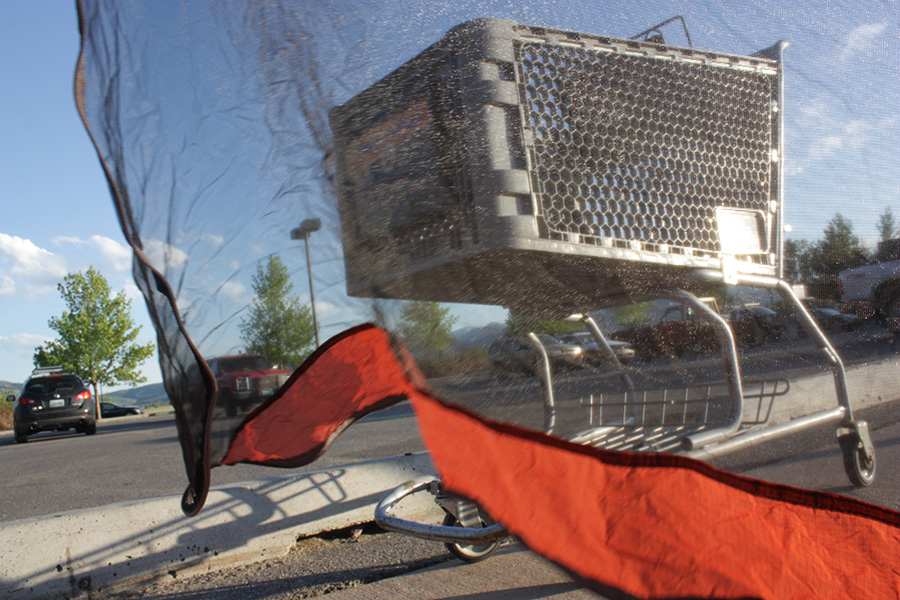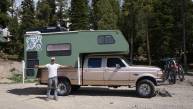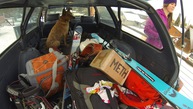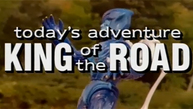Welcome to The Dirtbag’s Guide to Getting Shit Done. Twice a month, we'll dish out the dirty details on how to live the dream without breaking the bank.
Forget what you know about camping. Sleeping next to a babbling brook and watching the sunset through your tent door are overrated. Unfortunately, the outdoor industry has been a little too successful romanticizing camping—or at least making it synonymous with alpine lakes and granite peaks.
If you’re looking for an original adventure, try camping in landscapes defined by concrete, abandoned shopping carts, and a scarcity of vegetation. Typically avoided by those who eschew a love for camping, urban areas are the next frontier. You’ll find far more tents on Colorado Fourteeners or in the base camps of Everest than you will in Brooklyn. And although urban camping promises adventure (and the possibility of being charged with trespassing), it’s also a great way to save cash when traveling across the country or recovering from a recent eviction.

Ask for Permission . . . Or Slip Under the Radar?
Those who’ve spent significant time urban camping face a familiar debate—is it worth asking for permission? The answer often varies, as a single trip may require both approaches. Asking for permission ensures staying on the good side of the law and can open doors to new opportunities—playing Bingo with newfound friends at the VFW post, being invited to dinner by strangers, and watching Alf reruns inside a fire station. Asking for permission, however, does not guarantee you’ll receive it. It can also diminish the thrill of inhabiting a questionable site.
When asking for permission, be ready to steer the conversation. In smaller towns, police stations, churches, and firehouses are solid places to start. Identify someone who appears to have an element of authority and get ready to pop the question. Just be aware that your body odor and mustard stained Winger t-shirt will initially raise suspicion.
Open with an explanation of what brings you to town—it’s far better to state that you’re exploring America than that you’re selling meth from the trunk of your Chevette. If possible, emphasize that you’re looking for a place to camp just for the night and that you’ll be on your way early in the morning. Be prepared to preemptively suggest places to camp, such as the grassy area next to the police station, a city park, the rodeo grounds, or a ball diamond (if you have outstanding warrants, it’s best to skip the police station). Avoid inquiring about places like schools, where you stand to be the poster child of future “Stranger Danger” campaigns.

In a city of significant size, consider hitting up the private sector for places to camp. Local businesses, fraternal organizations, gas stations, and junkyards are potential options. If a business is likely to have an employee handbook or a corporate office, it’s not worth asking to camp in the planter.
If you avoid asking for permission, either make your site exceedingly obvious or escape detection by stealth camping. Hiding in plain sight often leads people to believe you have permission—unless they’re the ones responsible for providing it. String out your clothesline, hang up your underwear, and kick back with confidence. In the event that you face a confrontation, assess your accuser and work towards establishing the perfect blend of ignorance and apologies.
Stealth camping obviously requires secrecy. It’s best to locate a site with little fanfare and set up camp in the dark. Cook elsewhere and then establish your site, climbing into your tent and disappearing as quickly as possible. Look for areas that are not readily visible by passing cars or curious neighbors—places like baseball dugouts, cemeteries, grassy spots behind buildings, and areas concealed by embankments, vegetation, or the bodies of previous campers. Such places may even provide a degree of shelter that allows you to forgo using a tent.

Top Tips . . . or The Real Reason Tents Have Vestibules
Regardless of where you camp—and whether your experience is accompanied by permission—a few basic tips can keep you comfortable and ensure you stay alive. When selecting a site, anticipate threats to your general safety and sanity. Although appealing, sleeping in a roundabout next to a sobriety clinic or pitching a tent adjacent to a crack house is not recommended.
Equally important, anticipate whether or not your peaceful campsite will remain that way through the evening—and morning. The grassy parking lot at the fairgrounds may lose its appeal once visitors arrive with the sun. Conversely, don’t expect a campsite to become any better as the night progresses—unless you are prepared to drink heavily. Just because the Sonic drive-in closes at midnight doesn’t mean the staff turns off the lights and shitty music (compliments of the chain’s own live radio station).
When it comes to biological necessities, some advanced planning is necessary. Unless you have a premium site—and aren’t afraid of potential onlookers—keep cooking simple. A city flowerbed is not the place to perfect your culinary skills. It is, however, the perfect excuse to indulge in a diet of Mike and Ikes and rotisserie hot dogs.
With such a diet, nature will inevitably call. Consequently, it’s always good to identify nearby public restrooms—as well as when they may be locked for the evening. Better yet, find businesses that are open late and allow you to use their restroom without drawing attention to yourself. As there’s no shortage of urban sites that lack both restrooms and the privacy to piss anywhere, a tent with a vestibule might be your best friend.

The Best Campsites are Surrounded by Concrete
Urban camping is not for everyone. That’s part of why it’s possible to find solitude in the midst of interstate on-ramps, convenience stores, and strip malls. Yet it can also be a catalyst for communion. While traditional approaches to camping involve experiencing nature (at least narrowly defined), urban camping can also be about experiencing humanity. Strangers may stop by to visit, share their local knowledge, and inquire about your travels. Even when stealth camping, you have the opportunity to observe humanity—albeit it from a strange distance. Camping in urban areas can transform how you look at things. Strangers are friends you have yet to meet and the world becomes filled with campsites. Soon, you may view a community garden, an overpass, or a public sculpture not for what it is, but for the campsite it could easily become.








__video_thumb.jpg)




